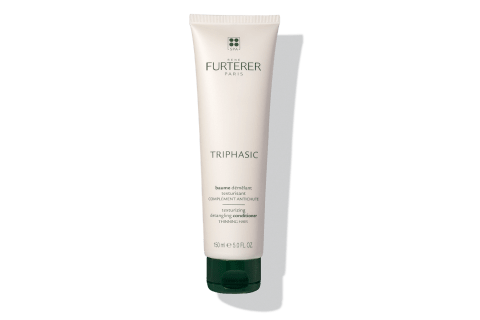
Our editors have independently chosen the products listed on this page. If you purchase something mentioned in this article, we may earn a small commission.
September 6, 2021 — 18:26 PM
Your eyelashes are fragile little hairs—so delicate that they can easily snap off and break, especially without proper hydration and care. Now, one or two stray flutters is likely nothing to sound the alarm over, but if you wake up with several lashes scattered across your pillow or have noticeable gaps on your lash line, you may be concerned about the increased shedding.
If your once lush set of lashes are lacking volume, check out these common culprits below—there’s a good chance one may be sabotaging your doe eyes.
Unlock All mbg Classes

According to board-certified dermatologist Jeanine Downie, M.D., stress is very much a factor in eyelash loss. Just as how stress can lead to increased hair shedding, an increase in anxiety can cause a similar effect on those tiny lash hairs. What happens is the stress pushes the follicles into a dormant phase (known as the telogen phase), which can cause those hairs to fall out.
It sounds serious and technical, but know that those hairs do eventually grow back with time: “Once the stressors are managed, the hair will subsequently respond by not shedding further and eventually regrow,” assures board-certified dermatologist Christine M. Shaver, M.D., at Bernstein Medical Center for Hair Restoration in New York City.
2. Irritation from false eyelashes or lash extensions.
Irritation from the falsies themselves is quite uncommon—but if you’re constantly dolloping glue onto your sensitive lash line, Downie says you might face a stray lash or two.
Camara Aunique, celebrity makeup artist and founder of handcrafted faux lash line Camara Aunique Beauty, agrees: “Lash extensions are great, but you have to spend enough time cleaning your lashes properly,” she tells us about losing eyelashes (i.e., washing off that excess glue to avoid irritation).
Trichotillomania is a specific disorder where people may face irresistible urges to pull out hair from the scalp, eyebrows, and lashes. It’s complex, and not every case is the exact same—but sometimes it’s linked to stress.
Rubbing the occasional itch most likely won’t do much harm, but constantly tugging on your eyes—with your palms, makeup remover, or even a lash curler—can damage the lid skin and may cause those lashes to fall out, says Downie.
5. An underlying health condition.
Board-certified dermatologist Loretta Ciraldo, M.D., FAAD, mentions a condition called alopecia areata (where you can lose body hair in circular patches) and hypo-thyroid disease (where you can lose the last third of your brows). In both cases, “I’ve had patients where they lost some of their lashes,” she previously told mbg.
6. Irritation from eye products.
Ciraldo mentions it’s very uncommon, but some people might experience a loss of lashes from irritating eye makeup (like liner, shadow, or mascara). See, contact dermatitis is especially prevalent around the eyes, which often manifests as a rash on or around the lids, but lash loss isn’t totally off the table.
7. Sleeping in your makeup.
Even the creamiest, most hydrating mascara can dry out the lashes overnight, which can lead to eyelash breakage and sparse flutters. Especially if you smash your face into the pillow while you sleep, as the stiff mascara can “crunch” your lashes against the fabric. “They may break because of their already brittle state,” board-certified dermatologist Hadley King, M.D., told us about sleeping in eye makeup.
“Some people have eyelashes that can shed a bit more than others,” Downie notes, as not everyone has the same hair growth rate—simple as that.
What can you do about it?
Yes, eyelashes do grow back, assuming the lid skin isn’t too damaged. It’s similar to regrowing your brows: If those tiny follicles are compromised by scars or burns, the eyelash hairs cannot grow back, no matter how many lash serums you pile on.
Find our full guide to grow eyelashes here, but we’ll discuss some of the highlights below:
1. Avoid physical stress.
Since rubbing your lashes is one of the main culprits for lash loss, you might want to, well, stop rubbing them. That includes with your palms and with makeup remover—remember to gently swipe off your eye makeup each night. You’ll also want to be very gentle with your lash curler, as you can easily pluck off hairs with a strong clutch. (And not all lash curlers are created equal: Find our favorite gentle, high-quality curlers here.)
2. Swap your eye makeup.
If you’re unsure what’s causing your lash loss, Ciraldo suggests relying on hypoallergenic eye makeup and see if that helps. A simple swap can help calm any irritation on your lash-line that you might not be aware of—it’s uncommon, but Ciraldo says sometimes the only manifestation of an allergy is some loss of lashes.
Plus, a number of clean, fragrance-free mascaras also come infused with healthy, lengthening actives (this serum-infused mascara, for instance, is infused with red clover flower and peptides).
3. Clean them regularly.
You should always, always remove your mascara each and every night to prevent more eyelash loss. Especially if you’re partial to eyelash extensions: Effectively (and gently) cleaning the lashes can prevent any buildup of gunk overtime, says Aunique. A good, gentle scrub with cleanser will do the trick.
Although, if you do crash into bed without removing your eye makeup (a major no, but it happens!) and wake up to crunchy, dried out lashes, don’t panic: Thoroughly remove your makeup in the morning, Downie suggests, and perhaps give your eyes a break from makeup for the day.
4. Keep them moisturized.
It’s the same advice you’ll hear for the hair on your head: To encourage growth, it’s important to keep the hairs you already have strong and healthy. For lashes, that means regularly coating them in moisture—for instance, you can find clean serum options loaded with conditioning ingredients like castor oil, honey, and vitamin E to protect and promote the growth of those fine hairs.
“[Castor oil] is super hydrating, so lashes don’t become brittle and dry or break,” board-certified dermatologist Ava Shamban, M.D., founder of SKINFIVE, has told us about castor oil for lashes. It has antioxidant and anti-inflammatory properties, and it’s both an emollient and an occlusive, which means it’s able to penetrate into the tiny strands and keep moisture from seeping out.
If your eyelash loss is significant or progressing, you might want to speak with your doctor or a dermatologist to make sure you don’t have any underlying health conditions. “Alopecia areata can respond to topical steroids, hypothyroidism needs treatment, and even trichotillomania sometimes resolves with behavior modification therapy,” Ciraldo says.
However, each condition is complex, each with their own unique mechanisms of action. Meaning, specific treatments differ for everyone, so you’ll want to work with a professional on your personal next steps.
Eyelashes can fall out for a variety of reasons, some more serious than others. Sometimes, the fix is as simple as a makeup swap—other times, the condition is a tad more complex and requires a trip to the derm. Just know that hair loss is incredibly common (on the eyes, too!) and you’re not alone.







